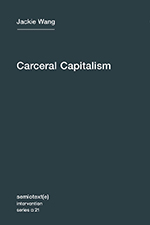 VERDICT: It’s a Keeper
VERDICT: It’s a Keeper
Carceral Capitalism
By Jackie Wang (Cambridge, MA: The MIT Press, 2018). 360 pgs. $13.95. Order, mitpress-orders@mit.edu.
Reviewed by Dianne Post
This small book covers big topics from predatory lending and financing, including of municipal services, to debtor prisons to guns to algorithmic policing to robocops to credit scores. All of this is to help Americans understand why we need a completely new vision of what our “criminal justice” system could and should be.
The author outlines state practices of extraction of funds (looting) from the most vulnerable individuals by cutting corporate taxes, gutting social services, and then increasing fines and fees imposed by police and courts, shifting to privatization, and imposing regressive taxation. The private sector does not escape examination: the author explains “expropriation” (theft) by predatory loans, for-profit prisons, and other “criminal justice services” and the use of algorithmic policing and credit scores as proxies for racial discrimination.
Want to Review a Book?
Please request a book and writing guidelines from Wisconsin Lawyer managing editor Karlé Lester, at klester@wisbar.org or (608) 250-6127. Reviewers may keep the book reviewed. Reviews of about 500 words are due within 45 days of receiving the book. Reviews are published, space permitting, in the order received and may be edited for length and clarity.
Lawyers should be concerned about predictive analytics to anticipate and prevent crime. The use of long-tainted data from centuries of racist policing leads to biased results, but the process can be claimed to be “objective” because it’s all computerized. GIGO (garbage in, garbage out) is very much in play.
Years of research show that incarceration is not related to levels of crime. Rather, prisons are working precisely as intended to control “unwanted” or “surplus” populations and for political repression. From slavery to Jim Crow to mass incarceration, Black people especially and people of color generally have been managed by mass incarceration. In one of the least violent times in American history, the public is misled to believe we live in a very violent society. The militarization of the police follows and leads to more state violence.
Mass incarceration intertwines with the debt society to shore up consumerism under capitalism and for the production of cheap goods, especially for military and state institutions. As the states fight a fiscal race to the bottom with tax breaks for large corporations that shift the burden down the line to counties and cities and the middle and poor classes, vulnerable individuals become targets for extortion.
The amount of Marxist analysis in the book seemed unnecessary and didn’t really add to understanding the dynamic. More analysis of the fraud and theft by financial institutions and Wall Street during the Great Recession, from redlining to subprime lending, would have been helpful, especially because Congress has refused to fix the underlying problems. The author focuses a little on Native Americans and women but could have balanced that more. Overall, the book is well worth reading for a deeper understanding of structural racism in the United States.
Dianne Post, U.W. 1979, is an international human rights lawyer. She practiced family law in Arizona for 18 years, mostly representing battered women and molested children, and then in 1998 began doing international work mainly on gender-based violence.
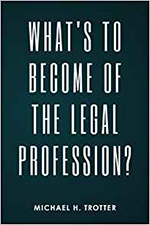 VERDICT: It’s a Keeper
VERDICT: It’s a Keeper
What’s to Become of the Legal Profession?
By Michael H. Trotter (North Charleston, SC: CreateSpace Independent Publishing, 2017). 147 pgs. $24. Order, www.amazon.com.
Reviewed by Thomas J. McClure
Few lawyers have the time, or the interest, to read about the future of the legal profession. Michael H. Trotter, an Atlanta lawyer and adjunct professor at Emory University Law School, has provided an alternative. Reflecting on his 55-year career interest in law firm management and economics, Trotter, in this self-published book, surveys the last 50 years of changes in the legal industry and what that bodes for the next century. His assessment for the profession’s future is “the world will continue to require more legal services and more lawyers to provide them.”
Referencing similar books and articles, Trotter assesses the industry literature and his own experiences, taking readers through every conceivable angle and current analysis of his topic areas and trying to ensure readers thoroughly understand each point. Readers will feel like an expert on the subject by the time they finish the book. Trotter excels in details as well as scope.
Trotter ambitiously takes the reader through every current type of law practice to educate on the changes occurring and accelerating on a daily basis. Using chapter topics such as the Evolution of the Legal Profession, Key Developments Since World War II, Evaluating Predictions Regarding the Last 20 Years, Why Haven’t Legal Services Become Information on the Internet? (and replaced lawyers), Legal Education, and New Opportunities for Lawyers, Trotter builds his case for what to expect for the future of the legal profession.
The book is chock full of developments in modern law firm employment arrangements and profit dynamics. In passing, Trotter notes how cutting-edge technologies, such as legal analytics, improve the delivery of legal services. But he indicates neither artificial intelligence nor dramatic changes in robotic or computer technology will replace the individual human lawyer’s legal craftsmanship and relational knowledge to work out problems with opponents, governments, or judges: “Such know-how and relationships are the stock-in-trade of experienced lawyers ….”
Also addressed are judicial management of litigation and discovery, including recent federal rules’ changes, and their future effect on state courts. The importance of arbitration and mediation, to help resolve the increasing volume of legal claims, is discussed. Thus, judges will also benefit from the book. Finally, emerging opportunities for nonpracticing lawyers, in the burgeoning fields of legal administrative support and legal business management jobs, are covered.
The book has a few weaknesses. First, there are instances of overly repetitive analyses that crop up in subsequent chapters. Second, there are too many subtitles, which can distract the reader. Finally, the book lacks end-of-chapter notes and subject-index sections (normally found at the back of a book) that would be helpful for topic and page reference or further research. Despite these issues, the book is well edited and carefully written and reads well.
In sum, this is a valuable and interesting book, by a well-qualified expert, on an important legal topic: every lawyer’s future.
Thomas J. McClure, Marquette 1980, is a Delafield solo practice trial attorney.
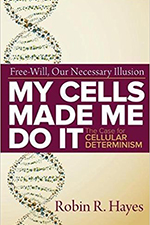 VERDICT: Not for Me, Maybe for You
VERDICT: Not for Me, Maybe for You
My Cells Made Me Do It: The Case for Cellular Determinism
By Robin R. Hayes (Abbeville, SC: Moonshine Cove Publishing LLC, 2017). 252 pgs. $15.99. Order, www.amazon.com.
Reviewed by John A. Becker
When I saw the title of this book in Wisconsin Lawyer, I assumed it would discuss legal issues such as when a person may claim diminished capacity because of heat of passion, anger, competency, or similar defenses. This book goes way beyond diminished capacity and suggests that all actions humans take are determined by cellular reaction to the environment. The premise of the book is that none of us has free will.
The author, a microbiologist, begins with a too-lengthy discussion of how individual cells react to stimuli. (For example, more than 20 pages discuss how sperm fertilize eggs.) The reaction of a cell is based on the nature of the cell and the nature of the external stimuli. Given the cell and the stimuli, each cell will react predictably in a certain situation. For example, a cell placed in a cold environment might respond differently than a cell placed in a warm environment; however, the cell will react in a predictable manner in response to the environment in which it exists.
On a grander scale, each human being is made up of billions of cells. As each cell reacts predictably, the collection of cells that make up a person will also act predictably such that the person has no control over the actions he or she takes.
The argument is similar to the philosophical-religious argument of predetermination. Some religions teach that God knows everything that is going to happen. Whatever we choose, God knows in advance what choice we are going to make, so is it really free will? The author tries to provide a scientific explanation to a philosophical argument.
The author starts with the assumption that a cell reacts in a certain manner in response to its external environment and cannot react in any other way. Therefore, our actions are not predetermined, as by God, but determined by the nature of our cells and environment. He then makes a giant leap in logic that, because we are made up of cells, the collection of cells that make up a person can only respond in one way. Even though we think we have free will, it is really just the predictable response of the collection of cells that make up the person.
An analogy is that a baby, or a person with a mental disability (for example, someone with dementia or bipolar disorder), will react to the external environment even though they may not be making a conscious decision to take that act. As our minds become more developed, we may believe we are making voluntary decisions, but it is just the cells reacting in the only way they can.
Although the author tries to simplify things for the average person, the first two-thirds of the book discuss science in a way only a microbiologist can explain it. The last one-third discusses the concept of cellular determination as it applies to free will. There is no way to prove the author’s theory, but it is an interesting concept and does make for interesting discussion.
John A. Becker, U.W. 1982, is a principal at Becker French & Durkin in Racine.
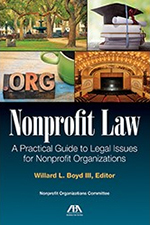 VERDICT: Touchdown!
VERDICT: Touchdown!
Nonprofit Law: A Practical Guide to Legal Issues for Nonprofit Organizations
Edited by Willard L. Boyd III (Chicago, IL: ABA Publishing, 2017). 144 pgs. $54.95. Order, www.ShopABA.org.
Reviewed by John L. Brown
Your community is full of nonprofits. You, your family, your friends, and your clients benefit from, and support, these often small organizations. Many of these organizations are started and operated by individuals with only superficial knowledge of the applicable law, and these people know it. Most cannot afford the legal fees required to be assured that they are complying with the law.
Nonprofit organizations often are led by passionate individuals who deeply believe in the organization but do not have experience in the economic realities of business and the law. This causes them to seek out lawyers to be board members and officers. Lawyers also are driven by their commitment to many of the causes served by local nonprofits and by their desire to provide pro bono services to their community.
While many law schools have nonprofit law elective courses, most lawyers did not take those classes. They find themselves volunteering to serve a local nonprofit without that legal background. When a legal question comes up, and the rest of the board looks to a lawyer-member, they expect the lawyer to immediately respond. But the lawyer might not know the answer. Where do you start your quest for such expertise?
Members of the nonprofit organizations committee of the ABA Business Law section created a series of webinars on nonprofit law for the “non” nonprofit lawyer. Those webinars were used to create Nonprofit Law: A Practical Guide to Legal Issues for Nonprofit Organizations. As I stepped into the role of the “non” nonprofit lawyer for several organizations, I found the book to be an excellent overview of this area of the law. It was both a good starting point and a means for locating sources of more detailed legal requirements in areas that required a deep dive. Its organization, writing style, and content allow you to quickly become a seasoned nonprofit lawyer.
John L. Brown, Iowa 1980, serves on four nonprofit boards and as associate chief counsel, John Deere Financial, Johnston, Iowa.
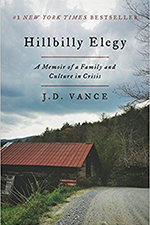 VERDICT: Touchdown!
VERDICT: Touchdown!
Hillbilly Elegy: A Memoir of a Family and Culture in Crisis
By J.D. Vance (New York, NY: HarperCollins, 2018). 291 pgs. $16. Order, www.amazon.com.
Reviewed by Nancy Barasch
While attending Yale Law School, J.D. Vance noticed that as a white man he appeared to fit the norm, but he was the only Yale Law student who was not from an intact family and the only student with Appalachian roots.
In Hillbilly Elegy, Vance comments, “Americans call them hillbillies, rednecks, or white trash. I call them neighbors, friends, and family.” He also observes that although working-class whites are not as disadvantaged as black Americans or Latino immigrants, they are the most pessimistic group. They are more pessimistic and angry than any other group. He subtitles his book as “A Memoir of a Family and Culture in Crisis.”
Vance’s extended family has been affected by the loss of manufacturing jobs and the shrinking of the middle class in the United States. Vance describes both the self-destruction of his friends and neighbors and their virtues. He also tells about how he came close to dropping out of high school.
Although Vance sees his extended family as being in crisis, he rejects easy answers. He believes that governmental programs can help but are not the total solution. Hillbilly Elegy has recently been reissued in paperback. In his new postscript, Vance states, “rich and poor; educated and uneducated; upper-class and working-class – their members increasingly occupy two different worlds.” Vance also states that he is no closer than he was two years ago in coming up with an answer for his community. This is not sociology. Instead it is a beautifully written memoir that makes it possible for the reader to walk in another person’s shoes.
Nancy Barasch, John Marshall 1985, resides in Kenosha.
